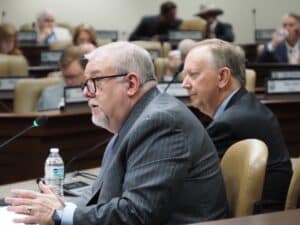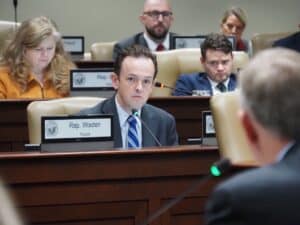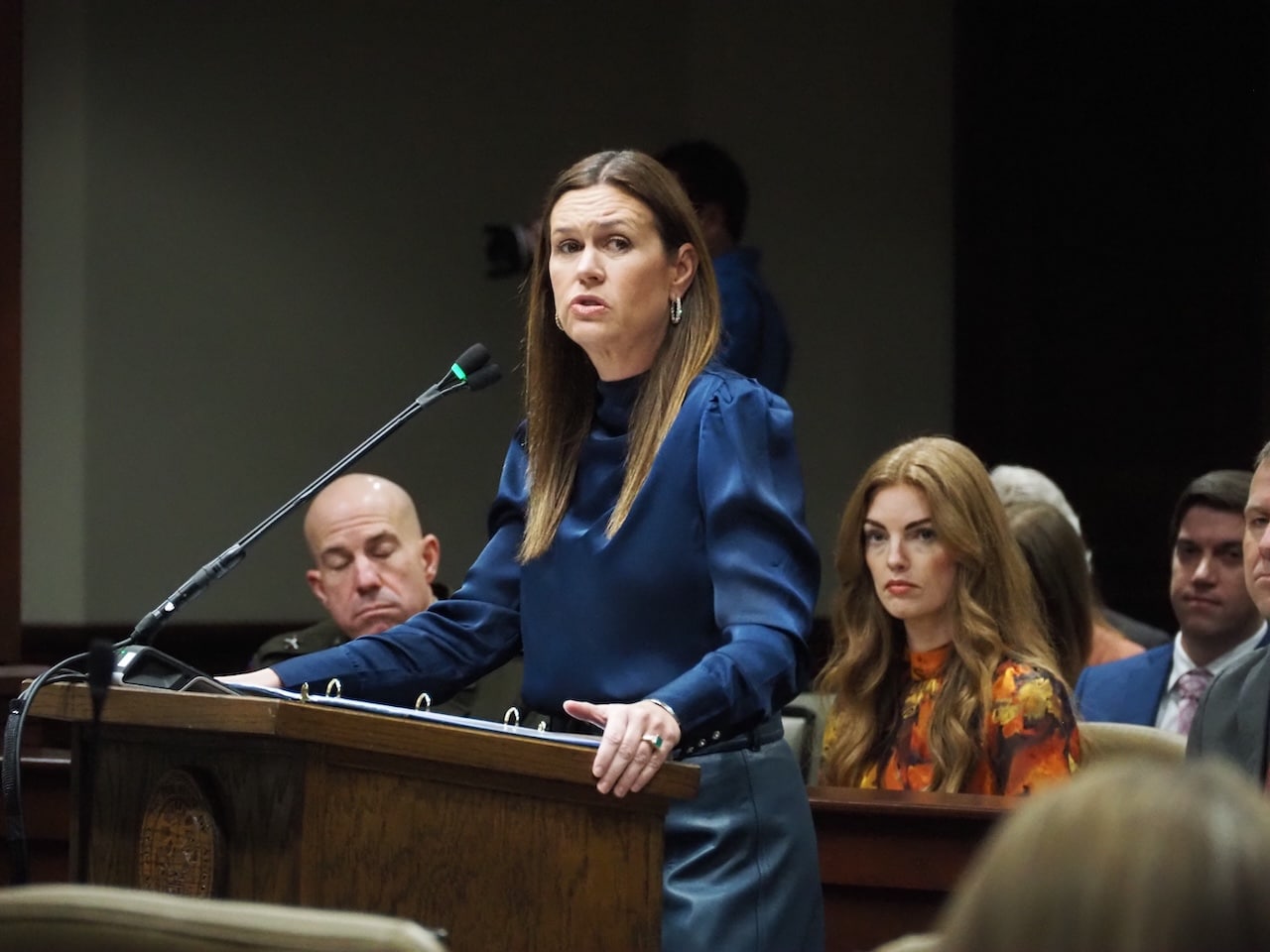Arkansas governor presents $6.49 billion budget proposal to state lawmakers

by Antoinette Grajeda, Arkansas Advocate
November 21, 2024
Gov. Sarah Huckabee Sanders proposed a $6.49 billion budget Thursday that raises spending by 2.89% and focuses on her priorities of education, maternal health, government efficiency and public safety.
The budget Sanders presented to the Arkansas Legislative Council’s Joint Budget Committee proposes a $182.5 million increase to the state’s general revenue budget in fiscal year 2026, which begins July 1, 2025.
“We’ve kept up large budget surpluses and at the same time, we’ve continued our investments in needed priorities while delivering not one, not two, but three tax cuts, lowering Arkansas’ top line tax rate by a full percentage point,” Sanders said. “This year’s balanced budget continues that trend of fiscal responsibility.”
Education is again a major focus of the governor’s budget, which proposes $90 million in additional funding for the state’s school voucher program as well as an additional $90 million in set-aside funding to meet what’s expected to be increased demand.
Created through the LEARNS Act, a wide-ranging 2023 education law, the Education Freedom Account program provides up to 90% of the annual per-student public school funding rate for allowable expenses, including private school tuition. The program is being phased in over three years until it’s available to all students during the 2025-2026 school year.
Governor Sanders FY26-27 Balanced Budget
Asked by Rep. Jim Wooten, R-Beebe, if an increase in EFA funding will harm public school students, Department of Finance and Administration Secretary Jim Hudson noted the funding comes from different revenue streams. Per-pupil funding for public school students is provided through the adequacy fund, which Hudson said is “more than adequate to cover the requirements to provide a constitutional standard of education in our public schools.”
“What we do in terms of the EFAs, the freedom accounts, comes from a completely different funding stream,” Hudson said. “And so yes, we can do both at the same time, one without harming the other.”
Recommendations made by lawmakers for adequacy funding would provide for around $262 million over two years to public schools, assuming that’s what’s approved, State Budget Direct Robert Brech said. The adequacy fund is expected to grow more than that and currently has a balance of $600 million, he said.
 House Speaker-designate Rep. Brian Evans, R-Cabot, listens to a budget presentation from Gov. Sarah Huckabee Sanders on Nov. 21, 2024. (Mary Hennigan/Arkansas Advocate)
House Speaker-designate Rep. Brian Evans, R-Cabot, listens to a budget presentation from Gov. Sarah Huckabee Sanders on Nov. 21, 2024. (Mary Hennigan/Arkansas Advocate)House Speaker-designate Rep. Brian Evans, R-Cabot, told the Advocate he was “very comfortable with the budget” and believes the governor has made a commitment to be “the education state.”
“We are going to raise the standards of education and to do that you have to provide the proper funding for that,” Evans said. “She is committed to this, committed to the EFA program [and] wants to make sure that is stable within our budget.”
House Minority Leader Rep. Andrew Collins, D-Little Rock, in a phone interview said he thinks the proposed budget is “a missed opportunity.”
“We have a lot of needs in this state, areas that people agree need investment like maternal health, mental health, public education,” Collins said. “And instead of seeing the investments we need in those areas, we’re seeing continued prioritization of vouchers, prisons and tax cuts for the wealthy, and I think the people of Arkansas deserve better than this budget.”
Maternal health
Sanders’ budget proposes $13 million for Medicaid to help support funding recommendations from the Strategic Committee for Maternal Health that the governor convened this year to address the state’s poor maternal health outcomes.
Arkansas has among the nation’s highest maternal and infant mortality rates, according to the Arkansas Center for Health Improvement. Additionally, Arkansas is the only state that has taken no action to adopt the federal option of extending postpartum Medicaid coverage from 60 days to 12 months after birth. Sanders has said this expansion would be “redundant” and “duplicative,” since the state has other insurance coverage options for postpartum low-income Arkansans.
“I know all of us want to find real solutions, not headline-grabbing programs that don’t actually solve the problem,” Sanders said Thursday. “This budget puts money behind that goal.”
Sanders’ proposed budget also includes $100 million in set-aside funding for Medicaid sustainability. Brech noted that the total $190 million in set-aside funding for Medicaid and the EFA program will only be used if necessary and are not part of the Revenue Stabilization Act, the law that prioritizes state government spending.
 Department of Finance and Administration Secretary Jim Hudson (left) and State Budget Director Robert Brech answer questions about the 2025 state budget from lawmakers on Nov. 21, 2024. (Mary Hennigan/Arkansas Advocate)
Department of Finance and Administration Secretary Jim Hudson (left) and State Budget Director Robert Brech answer questions about the 2025 state budget from lawmakers on Nov. 21, 2024. (Mary Hennigan/Arkansas Advocate)“It’s not known at this time if those will be necessary,” Brech said. “In the event they are, those set-asides could be used and then built into the budget afterwards, but what we didn’t want to do is put too much money in the RSA when it wasn’t needed.”
Hudson said recent legislative budget hearings have included several conversations around fund balances and the expectation that “agencies need to be looking at ways to bring those balances down, either through better spending or looking at reducing fees.”
Joint Budget Committee chair Sen. Jonathan Dismang, R-Searcy, told the Advocate having the set-aside funding available but not including it in the budget is the correct decision.
“I know there’s some discussion about utilizing the adequacy trust fund and the Medicaid trust fund, both of those dollars are collected for a specific purpose,” Dismang said. “There is no other thing you can utilize them for, so I think drawing on those fund balances is the right thing to do, especially when they’re growing at the rate that they are.”
Collins said he’s concerned about using “one-time money to shore up the budget.”
“That puts authority for spending in the executive [branch] and in a small group of legislators rather than the entire Legislature where spending authority is supposed to be vested, and I think that’s a bit of a concern,” he said. “It really shouldn’t be the way we do business in the ordinary course of things.”
 House Minority Leader Rep. Andrew Collins, D-Little Rock, asks a question about the state’s biennium budget on Nov. 21, 2024. (Mary Hennigan/Arkansas Advocate)
House Minority Leader Rep. Andrew Collins, D-Little Rock, asks a question about the state’s biennium budget on Nov. 21, 2024. (Mary Hennigan/Arkansas Advocate)Government efficiency
Sanders last week announced a restructuring of the state employee pay plan that’s expected to cost $102 million, with nearly $60 million coming from general revenue and $42 million from “other sources,” according to a press release from her office.
The new plan will raise some salaries to labor market rates, clarify promotion ladders in each agency and consolidate about 2,200 job titles into just over 800 without reducing the number of jobs, according to the release.
Arkansas state employee pay plan overhaul boosts salaries for hard-to-fill jobs
Sanders told lawmakers Thursday that the pay plan will help recruit and retain workers, and “be key to our larger goal of delivering better, more efficient government for the people of Arkansas.”
While the majority of the $102 million commitment comes from existing streams, the budget also proposes $3.15 million in new funding for pay raises, she said.
State agency leaders should be able to accommodate the updated pay schedule within existing budgets, the governor said last week.
The plan will go into effect in July as part of the fiscal year 2026 state budget if approved by the Legislature during the upcoming legislative session.
Other needs
Sanders’ Thursday presentation of her required balanced budget also featured “support for our state’s other critical needs,” she said, including about $50 million for corrections, $6 million for higher education, $4 million for the Division of Youth Services and $1 million for foster child placement.
“These numbers might seem small in a multimillion dollar budget, but their impact is enormous,” she said.
Sanders highlighted the state’s success with foster-care work, noting there are fewer than 200 kids waiting for adoption for the first time since the state started keeping track, but much of the public focus in recent weeks has been her work with building a new prison.
Sanders’ announcement that the state had purchased 815 acres for $2.95 million in Franklin County with the intent of building a prison with up to 3,000 beds blindsided state officials and local residents.
Despite community pushback, the Arkansas Board of Corrections approved the state’s land purchase. State officials have said the prison’s cost will depend on what design is selected, but noted $330 million has been set aside by the Legislature and there’s another $75 million in reserves.
Reporter Mary Hennigan contributed to this report.
Arkansas Advocate is part of States Newsroom, a nonprofit news network supported by grants and a coalition of donors as a 501c(3) public charity. Arkansas Advocate maintains editorial independence. Contact Editor Sonny Albarado for questions: info@arkansasadvocate.com. Follow Arkansas Advocate on Facebook and X.



